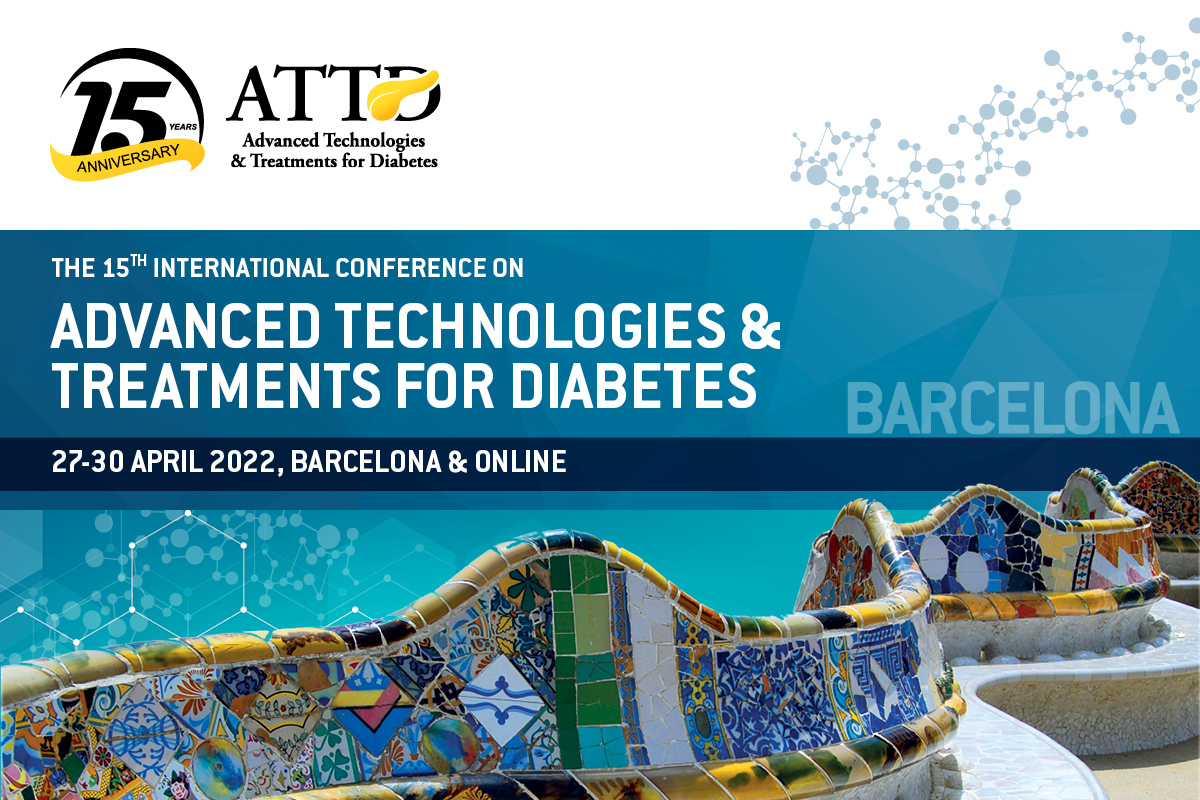
Leading researchers gathered, in person, for the annual meeting of the Advanced Technologies & Treatments for Diabetes (ATTD) Conference, which took place from April 27-30. There were more than 4,000 attendees from 100 countries attending, both in Barcelona and virtually, and featured more than 30 studies presented by Breakthrough T1D researchers, funded now or in the past, working to find cures for type 1 diabetes (T1D) and improve the lives of those living with the disease today.
Here are a few highlights:
- Results from the multi-center randomized insulin-only iLet bionic pancreas pivotal trial were presented by Steven Russell, M.D., Ph.D. The iLet system focuses on ease-of-use: Only a person’s weight is needed for initiation; the only setting to adjust is the glucose target; and mealtime announcements do not require carb counting. Those on iLet saw a +2.6 hour per day time-in-range improvement relative to the standard care group, improving from 51 percent at baseline to 65 percent at 13 weeks. In the iLet group, A1c fell from 7.9 percent at baseline to 7.3 percent at 13 weeks.
Dr. Russell received a Breakthrough T1D grant from 2013-2016 to refine the iLet pancreas, based upon the work of Ed Damiano, Ph.D., CEO of Beta Bionics, who Breakthrough T1D funded from 2009-2011, for his early research testing the safety and efficacy of a novel closed-loop system (including Firas El-Khatib, Ph.D., a Breakthrough T1D postdoctoral fellow in his lab). The results of this work helped to inform the development of the iLet bionic pancreas.
- The findings from the InRange clinical trial were presented—the first-ever major industry-sponsored drug trial to use time-in-range as the primary outcome. Results, given by world-renowned scientists Richard Bergenstal, M.D., Thomas Danne, M.D., Tadej Battelino, M.D., Ph.D., Eric Renard, M.D., Ph.D., and Pratik Choudhary, M.D., Ph.D., found no significant difference in Toujeo (insulin glargine) and Tresiba (insulin degludec) users at 12 weeks using time-in-range. This is another step forward for the use of time-in-range and CGM metrics, and we look forward to hearing more on this front. (Go here if you want to read Breakthrough T1D’s position on time-in-range.)
- Stephanie Amiel, M.D., FRCP, a Breakthrough T1D grantee since she was a postdoc in the 1980s, presented results from the HARPdoc trial. The results, published in Nature Communications, showed that the behavioral health program HARPdoc did not reduce severe hypoglycemia compared to Blood Glucose Awareness Training (BGAT)—which was developed in the late 1980s—but it was superior to BGAT in reducing diabetes distress, depression, and anxiety, and these improvements in mental health were sustained over the entire duration of follow up.
The 2022 Insulin Centennial Award, a new initiative which aims to recognize the value and importance of continued innovation in diabetes, was given to Dr. Amiel. It was presented by Irl Hirsch, M.D., who praised Dr. Amiel for her major contributions to the care and quality of life for people with diabetes.
- Abbott, Ypsomed, and CamDiab announced a new partnership to develop an artificial pancreas system, using the Abbott FreeStyle Libre® 3 sensor, CamDiab’s CamAPS® FX mobile app, and Ypsomed’s mylifeTM YpsoPump®. The companies intend to complete development by the end of 2022 with commercial availability expected thereafter. This will be the first commercial system to come to market with an Abbott CGM.
Breakthrough T1D funding helped create the algorithm and pump for this partnership. The algorithm was developed by Roman Hovorka, Ph.D., who had several Breakthrough T1D grants from 2006 to 2019; it came to the UK market in 2020. Breakthrough T1D and Ypsomed have an ongoing pump development partnership as part of Breakthrough T1D’s Open-Protocol Automated Insulin Delivery System Initiative.
- Revital Nimri, D.Med., and Moshe Phillip, M.D., provided an update on the international consensus meeting on AID technology. Yet to be published, the consensus will recommend that artificial pancreas systems should be “considered” for and made available for all people with type 1 diabetes, especially those facing challenges with general glycemic management, hypoglycemia, and/or significant glycemic variability. The group also recommended that “all the payers (government and private) should reimburse/cover the AID systems along with initial and ongoing AID education and support for the management of T1D.” This is based on evidence that has repeatedly shown that AID provides greater time-in-range improvements than any other current technology.
It’s conference time! The next big conference is the American Diabetes Association 82nd Scientific Sessions, which will run from June 3-7 in New Orleans. Throughout it, Breakthrough T1D will be sharing updates, from the blog to interviews with key researchers and early-career scientists to a “Happy Hour” with CEO Aaron J. Kowalski, Ph.D. To stay updated, follow us on Facebook (@Breakthrought1dHQ) and X (@BreakthroughT1D).